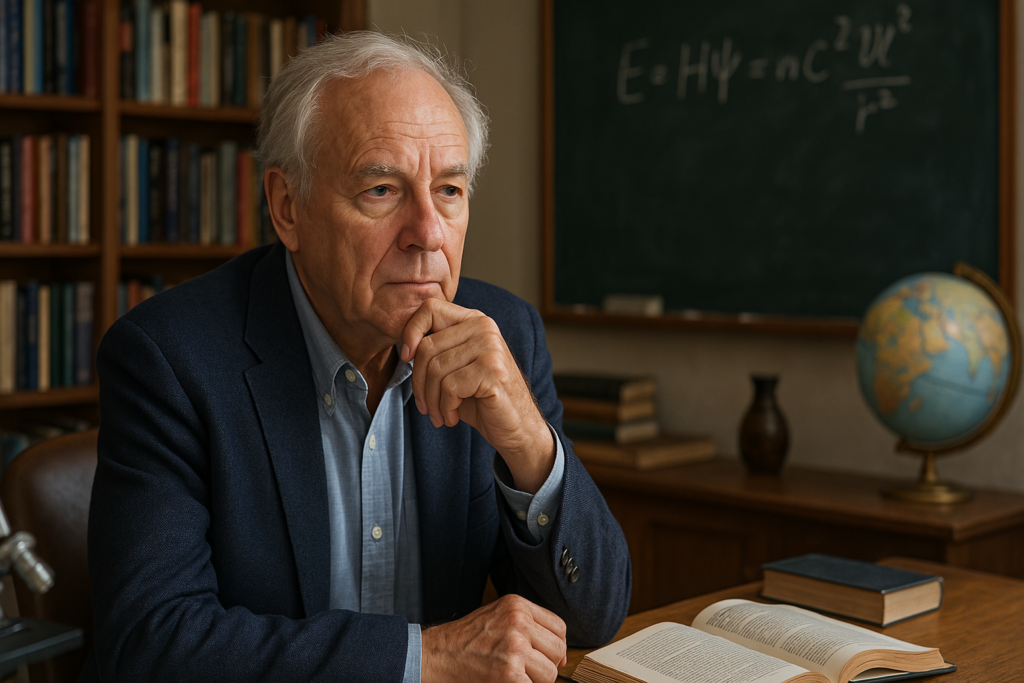Unveiling the Cosmos: The Life and Work of Dr. Bernard Haisch, Ph.D.
 In the vast expanse of scientific inquiry, few have dared to tread the enigmatic paths that connect the physical universe with the realm of consciousness. Dr. Bernard Haisch, Ph.D., stands as a pioneering figure in this extraordinary journey. This blog post delves into the life and career of Dr. Haisch, highlighting his remarkable contributions to our understanding of consciousness and its relation to the physical universe. Through a blend of biography and scientific exploration, we aim to unravel the profound impact of Dr. Haisch’s work and its implications for both science and spirituality.
In the vast expanse of scientific inquiry, few have dared to tread the enigmatic paths that connect the physical universe with the realm of consciousness. Dr. Bernard Haisch, Ph.D., stands as a pioneering figure in this extraordinary journey. This blog post delves into the life and career of Dr. Haisch, highlighting his remarkable contributions to our understanding of consciousness and its relation to the physical universe. Through a blend of biography and scientific exploration, we aim to unravel the profound impact of Dr. Haisch’s work and its implications for both science and spirituality.
History and Background
Early Life and Education
Born on March 29, 1947, in Stuttgart, Germany, Bernard Haisch showed an early fascination with the stars and the mysteries of the cosmos. This curiosity propelled him to pursue a career in astrophysics. He earned his Bachelor’s degree in Mathematics and Physics from the University of Stuttgart and later moved to the United States to complete his Ph.D. in Astronomy at the University of Wisconsin-Madison in 1975.
Career Beginnings
Dr. Haisch’s professional journey began with traditional astrophysical research, including a focus on solar and stellar physics. He held prestigious positions at institutions such as the Lockheed Martin Solar and Astrophysics Laboratory and the University of Colorado. His early work contributed significantly to our understanding of the Sun’s outer atmosphere and the mechanisms of stellar flares.
Core Concepts/Principles
The Zero Point Field and Consciousness
One of the most groundbreaking aspects of Dr. Haisch’s career is his exploration of the Zero Point Field (ZPF) and its potential connections to consciousness. The ZPF refers to the lowest possible energy state of a quantum system, a concept rooted in quantum mechanics. Dr. Haisch proposed that the ZPF could be the source of consciousness, suggesting that what we perceive as consciousness might arise from interactions with this ubiquitous energy field.
The God Theory
In his seminal book, “The God Theory,” Dr. Haisch posited that the universe and consciousness are intrinsically linked. He argued that consciousness is not a mere byproduct of brain activity but a fundamental aspect of the universe itself. This theory bridges the gap between science and spirituality, offering a holistic view of existence.
Intelligent Design and Evolution
Dr. Haisch has also delved into the contentious debate between intelligent design and evolution. He suggested that the laws of physics and the constants of nature are fine-tuned to allow for the emergence of life and consciousness. This perspective does not necessarily contradict evolution but rather complements it by proposing a purposeful underlying framework.
Current Trends and Developments
Recent Research
In recent years, Dr. Haisch has continued to explore the intersections of quantum mechanics and consciousness. His work has garnered attention in both scientific and metaphysical circles, inspiring new research into the nature of reality and the potential for a unified theory that encompasses both the physical and the conscious.
Collaborations and Interdisciplinary Approaches
Dr. Haisch has collaborated with various scientists, philosophers, and spiritual leaders to further investigate the nature of consciousness. These interdisciplinary efforts have led to innovative theories and experimental approaches aimed at understanding how consciousness interacts with the physical world.
Applications and Implications
Technological Innovations
The implications of Dr. Haisch’s work extend beyond theoretical physics into practical applications. For instance, understanding the ZPF and its properties could revolutionize energy generation and storage technologies. Additionally, insights into the nature of consciousness could lead to advancements in artificial intelligence, enhancing machines’ ability to mimic human thought processes.
Societal Impact
Dr. Haisch’s theories challenge traditional views on the nature of reality, prompting a reevaluation of how we perceive ourselves and our place in the universe. This paradigm shift has profound implications for education, mental health, and our collective approach to solving global challenges.
Challenges and Solutions
Scientific Skepticism
One of the primary challenges Dr. Haisch faces is skepticism from the scientific community. His theories, which often intersect with metaphysical concepts, are sometimes viewed with caution. However, Dr. Haisch advocates for open-mindedness and the integration of diverse perspectives to foster a more comprehensive understanding of reality.
Bridging Science and Spirituality
Another challenge is the integration of scientific and spiritual viewpoints. Dr. Haisch’s work strives to create a dialogue between these traditionally separate domains, emphasizing the need for a holistic approach to understanding consciousness and the universe.
Future Prospects
Expanding Research
The future of Dr. Haisch’s work lies in expanding and deepening the research into the ZPF and consciousness. This includes developing experimental methods to test his theories and collaborating with researchers across various disciplines.
Potential Impact
As research progresses, the potential impact of Dr. Haisch’s theories could be transformative. A deeper understanding of consciousness and its relation to the physical universe could lead to groundbreaking discoveries in both science and spirituality, ultimately enriching our knowledge of existence.
Case Studies/Examples
Experimental Evidence
Several experimental studies have sought to explore the properties of the ZPF and its potential connections to consciousness. These studies, though in their early stages, offer intriguing insights and support for some of Dr. Haisch’s theories.
Philosophical and Spiritual Implications
Philosophical discussions and spiritual teachings have also engaged with Dr. Haisch’s ideas, exploring their implications for understanding the nature of reality and human existence. These dialogues contribute to a growing body of thought that bridges the gap between science and spirituality.
Conclusion
Dr. Bernard Haisch’s work represents a bold and innovative attempt to understand the profound connections between consciousness and the physical universe. His theories challenge conventional wisdom and invite us to explore new frontiers in both science and spirituality. As research continues to evolve, the potential for groundbreaking discoveries and transformative insights remains vast. Dr. Haisch’s legacy is one of curiosity, courage, and a relentless pursuit of knowledge, inspiring future generations to seek a deeper understanding of the cosmos and our place within it.
Call to Action
If you found this exploration of Dr. Bernard Haisch’s work fascinating, we encourage you to sign up for our newsletter for more in-depth articles on science and consciousness. Leave your comments below to share your thoughts and engage in discussions. Share this article with others who might be interested in the profound connections between science and spirituality. For further reading and related blog posts, visit our website and explore the wealth of knowledge waiting for you.
Including images, charts, and infographics throughout this post will enhance the visual appeal and understanding of the content. Relevant images could include portraits of Dr. Haisch, diagrams of the Zero Point Field, and visual representations of his theories on consciousness.


Leave a Reply